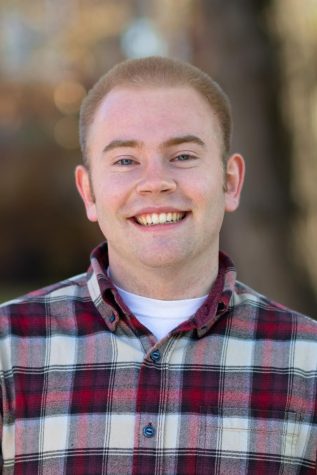Hilinskis remember Tyler one year later
Family opens up about life without their son, efforts to bring mental health trainings to athletes at WSU
In the year since Tyler’s death, the Hilinski family has raised over $300,000 for student-athlete mental health and continued to tell the former WSU quarterback’s story. “The support has been absolutely incredible,” said Tyler’s mom, Kym.
January 16, 2019
For the past year, Mark and Kym Hilinski have dealt with the loss of their son, Tyler. It has not been easy, and challenges arise daily.
“Some days it’s an hourly decision about how to breathe,” Mark said.
But the family is moving forward and focused on keeping Tyler Hilinski’s name alive through the Hilinski’s Hope Foundation.
The non-profit was established in April after Tyler died of suicide one year ago today. Its mission is to keep telling Tyler’s story and help fund programs that will help erase the stigma surrounding mental health.
Hilinski’s Hope has raised over $300,000 to date and sent bracelets with Tyler’s No. 3 on them to people all across the world.
“The support has been absolutely incredible, and I always say that just because I’m so sad,” Kym said. “So, it’s hard for me to be positive and happy when I’m really just miserable.”
The day that ultimately led the Hilinski family on this journey is still fresh in their mind.
Mark recalls receiving a phone call from Antonio Huffman, former WSU director of football operations, on the afternoon of Jan. 16, 2018.
Huffman told the family Tyler did not show up for a workout and 7-on-7 drills that day. Immediately Mark knew something was up because his son never missed a chance to practice with his teammates.
Huffman explained that he was going to file a missing person’s report with the police and have them complete a wellness check.
Panic set in. Mark frantically got in his car and headed toward the John Wayne Airport in California. Suddenly he got a call from his oldest son, Kelly Hilinski. Linebacker Peyton Pelluer had informed Kelly that Tyler was dead.
That moment, that day and that tragedy will forever be etched in the minds of the Hilinski family.
“I always have to go back and remind myself that Tyler wouldn’t want me to sit in a room and cry all day long,” Kym said, “even though sometimes that’s what I feel like doing.”
Now the family is investing in mental health practices and trainings to ensure this doesn’t happen to another student-athlete again.
In October, Hilinski’s Hope brought a program called Strength is Asking for Help: Athlete to Athlete Mental Health Training to WSU. The program incorporates a course called Behind Happy Faces, which helps people cope with mental health and the bystander intervention program Step Up.
Hilinski’s Hope paid for mental health experts to come to Pullman and train a group of athletes on the Student-Athlete Advisory Committee (SAAC), who facilitated the program through three training sessions over two months to fellow student athletes.
Andrew Cooper, Ray Littles and Tierney Silliman were all members of the SAAC mental health committee who helped lead the trainings.
Cooper, SAAC president and junior track and field athlete, said the program opened his eyes and helped start a conversation about student-athlete mental health at WSU.
He said athletes face challenges most people do not because of the pressure to act tough, which can be overwhelming.
“Being in a space where it’s safe,” Cooper said, “where you’re encouraged to be authentic, honest and vulnerable is unique, and something that hasn’t been here before.”
Littles, SAAC member and senior track and field athlete, said in the past mental health trainings have occurred in reaction to a tragedy, but this time they were performed proactively.
“These trainings did a good job of addressing the fact that you need to check yourself every day and just see how you’re feeling,” he said.
Silliman, who is also a SAAC member and redshirt junior track and field athlete, said the trainings gave athletes tools to cope with mental health issues, which they could translate into living better lives.
Silliman said she went into the trainings with the belief she had it figured out and then learned how to open up about her own struggles.
She said the progress Hilinski’s Hope has made bringing awareness to student-athlete mental health over the past year has been incredible.
“Even though it was born from something horrific,” Silliman said, “the passion that the family has for mental health and getting their message out there really has been a blessing for the university.”
Cooper never met Tyler, but he remembers seeing him while standing in line at Panda Express the Monday after the quarterback led WSU to a comeback victory over Boise State. Cooper said Tyler smiled and it made his day.
“I think as tragic as Tyler’s passing was, how drastically it started the conversation and opened the floodgates for us to talk about mental health has been profound,” he said.
This program has also been brought to Eastern Washington University and University of Idaho. The goal is to eventually bring it to schools around the country.
Mark said currently they are in a position of collecting data and providing the training as they try to study the effectiveness of the program over a longer period of time.
Hilinski’s Hope is currently in contact with several universities including University of Michigan, Boise State University and University of South Carolina about potentially bringing the program to them.
Mark said Hilinski’s Hope can step in as a funding mechanism for schools that don’t have the resources or budget to implement the program on their own.
Eventually, Mark hopes universities will invest in the trainings so it becomes a part of their budget. He said mental health is a complex problem where people have a hard time speaking up.
“Tyler could tell me anything,” Mark said, “but he couldn’t tell me he was sick, he couldn’t tell me he was going to steal a gun and end his life.”
The goal of Hilinski’s Hope is not to prevent suicides, but improve and address the mental health issues in a student-athlete’s life, Mark said.
“We know by doing that,” he said, “we have saved dozens if not hundreds of lives not because we’ve done something, but because we’ve continued to talk about it.”
The Hilinski’s are currently in the process of creating a scholarship at WSU in Tyler’s name. It will be called the Tyler Hilinski Memorial Scholarship and will be officially established soon, said Trevor Durham, associate vice president at the WSU Foundation, in an email.
The scholarship is expected to be worth $1,000 and will start to be awarded in fall 2019, Durham wrote.
The criteria for qualifying for the scholarship has yet to be finalized, Durham wrote. But Kym said it will be given to a student-athlete who maintains a GPA of 3.0 or above.
Donors have given $71,172 to the university in Tyler’s name as of Dec. 31, 2018, Durham wrote.
Kym said they receive calls, emails and texts throughout each day thanking them for sharing Tyler’s story and destigmatizing mental illness.
Both Mark and Kym hear stories frequently from people who faced similar situations, which has helped them get through the loss of their son.
Mark said they are glad they have been able to bring attention to student-athlete mental health while continuing to honor Tyler.
“I feel positive that we’re going in the right direction,” he said, “but it’s an awfully long road to make a lot of progress.”
Mark and Kym said they talk about Tyler all the time and it would take hours to explain what they remember most about him.
“I think what I miss is just looking at that sweet smile, hearing his voice say ‘Hey Mama’ and just being with him,” Kym said. “He’s my baby, and I just loved being with that sweet kid.”
If you are in need of emotional support, call the 24-hour a day National Suicide Prevention Lifeline at 1-800-273-8255, which is a confidential service to those in distress.
WSU Counseling and Psychological Services can also be contacted online, and after hours at 509-335-2159.























Sandy Marshall • Jan 25, 2019 at 7:17 am
Thank you for this story. So glad there will be a scholarship at WSU in Tyler’s name. Tyler’s family through http://Www.hilinskishope.org is saving lives. I look forward to WSU LEADING THE PAC in this mission to improve mental health and help prevent suicide.